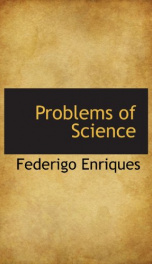problems of science

Purchase of this book includes free trial access to www.million-books.com where you can read more than a million books for free. This is an OCR edition with typos. Excerpt from book: I. INTRODUCTION. 1. THE SPECIAL PROBLEMS AND GENERAL IDEAS OF SCIENCE A DOUBLE fatality hangs over one who has consecrated his days to science. If he would contribute to the advancement of science, he must prepare himself first of all by a patient study of the thousands of details which constitute its technique; he must learn the results obtained by numberless laborers whose researches tend toward the same aim. He must master their conceptions and subject them to a new criticism. This work so engrosses the attention of the investigator that he has little time left for casting a glance over the branches of science which are developing beside him. Yet this necessity also weighs upon his soul! If on the one hand he ought to study special problems, on the other, he cannot exempt himself from considering the ends set before special research by rising to a general outlook which shall command the view of a broader scientific basis. This double necessity causes a conflict of tendencies, and this conflict in our system of production results in a loss of time and of work from which the intellectual world suffers. Most investigators, if they are not rightly directed, shut themselves up in a narrow circle and fall into a blind empiricism. Others lose themselves in the region of confused generalities, while a few finer spirits find the way for themselves, and often must win again by fresh efforts that which they should have a right to expect as the outcome of the completed work of their companions in labor. But the age of heroes, that of Descartes or Leibniz, whose genius opened all the doors of science, seems closed forever! The conquests of the past weigh upon the present and upon the future. And if it is permissible to hope that a happier use of our intellectual powe... --This text refers to an alternate Paperback edition.
Info about the book
Author:
Series:
Unknown
ISBN:
1112231439
Rating:
2.5/5 (4)Your rating:
0/5
Languge:
English
Users who have this book
Users who want this book
What readers are saying
What do you think? Write your own comment on this book!
write a commentif you like problems of science try:
Other books by this author
Do you want to read a book that interests you? It’s EASY!
Create an account and send a request for reading to other users on the Webpage of the book!

